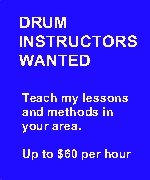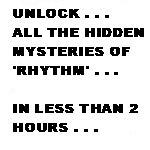 

Lesson Menu #2
Intermediate & Advanced.
Lesson Menu #3
Advanced & Ultra-Advanced.
Lesson Menu #4
Text lessons: All levels.

PRODUCTS:

GET ALL THE PRODUCTS AT ONE LOW PRICE.

SURPRISES ABOUND . . . For those with a bit of generosity
in their soul.
CLICK HERE , to see what I mean.

Intermediate & Advanced
Drummers
 Your future is waiting.
Your future is waiting.

ALL MUSICIANS
MASTER
ALL RHYTHM,
This FASCINATING WAY!
 Discover the 'LOST KEY' for Unraveling
ALL the mysteries of rhythm, and musical time.
Discover the 'LOST KEY' for Unraveling
ALL the mysteries of rhythm, and musical time.
This work
is the crowning-achievement of my 50 year career, and it's
my proudest accomplishment.
It contains the potential to help YOU change the face of modern music!
You'll love it! CLICK HERE to check it
out completely! You're in for a MAJOR surprise!
 "PRE-SCHOOL DRUMMER?
"PRE-SCHOOL DRUMMER?
YES!"
Can we teach rhythm
to pre-schoolers? YES!

This is a very short course,
designed to help adults plant the seeds of rhythm
into children of nearly any age.
CLICK HERE
 FREE ELECTRONIC BOOK BONUS (also included)
FREE ELECTRONIC BOOK BONUS (also included)
 BUSINESS OPPORTUNITY:
BUSINESS OPPORTUNITY:
MAKE BIG MONEY SELLING USED DRUMSETS!
* INSIDER HARDBALL-BUYING-TIPS AND SECRETS.
* UNIQUE RECOVERING SECRETS

Support this site and and gain an advetising bargain with the deal.
 Place a permanent ad here. Place a permanent ad here.

GET ALL THE PRODUCTS AT ONE LOW PRICE.

SURPRISES ABOUND . . . For those with a bit of generosity
in their soul.
CLICK HERE , to see what I mean.

|
|
Downloads *
Drummers Trivia *
Drummers Chat Rooms *
Rudiments *
Digital Music *
Knowledge Assessments *
TD Archives *
Drum Set Buyers Guide *
Bass-Player Jokes *
Assembling a Drum Set *
Parts of a Drum Set *
About HSID *
Video Troubleshooter
Bill Powelson's School of Drums
School of Drums
Issue #1_____\__\__\__\__\__________/__/__/__/__/01/05/97
___________________________________________________________________
***FEATURE ARTICLE***
DRUMMING
Creativity VS.. Academics
"The Best Drummers Live In Both Worlds"!
THE SECRET TO BECOMING A GREAT DRUMMER:
The secret to becoming a great drummer is a balancing act
between creativity and academics. Too little of either ingredient
may produce less than perfect results. Every drummer needs a
combination of academic knowledge and creative flow, if the greatest
success is to be expected.
The trick to gaining control over your career and reaching
all your intended goals may be as simple as doing a quick self
evaluation, HERE and NOW! First, determine if you fall into one of
these two categories then simply adjust your habits enough to get on
a fast track to success.
********************
NATURAL DRUMMERS
TYPE A: (Natural Drummers)
I personally know hundreds of great drummers who do not
know a quarter note from an eighth note . . . or a paradiddle from
a flam. These same drummers are out there on the front lines, in
the bars, nightclubs and honkey tonks of the World playing their
hearts out every night for their supper.
For lack of a better word, we will call them 'naturals'.
Many of these 'naturals' will knock your socks off! They play
terrific drums but they may never be as great as they might have
been without a touch of academic knowledge.
IF YOU ARE A NATURAL:
It is quite common for many natural drummers to experience
some degree of difficulty with written notation. An inability to read
is often the single most limiting factor toward achieving absolute
success. If you have experienced problems reading drum notation,
Maybe this little tip will help:
Try learning to read, in a reverse order. In other words
try your hand at writing! You heard me correctly! Try writing beat
patterns that you can play already. Don't worry about fancy
notation, complicated math and elaborate symbols and terminology. Simply
place Xs on paper. Think of your favorite beat, lay out the cymbal line
as Xs on paper, then determine where the basses and snares fall in relation
to the cymbal notes. It goes without saying, if you can write a pattern,
surely you will be able to read it. Your reading/writing ability will
expand as you do this more and more. Before long, as you gain more
knowledge, the Xs will grow stems and flags, becoming
full-fledged notation. Suddenly it will become apparent that
reading or writing notation is no longer an intimidating task. You
will need to do this on a regular basis or it may not be effective. Give
it a try though . . . You may surprise yourself!
If reading drum notation is really a problem for you and you
would like some special help. Pay a visit to my website and
study these three lessons:
DRUMMERS APTITUDE TEST:
READING DRUM NOTATION:
BASIC DANCE BEATS:
Your 'onstage' confidence will improve tremendously with the
knowledge gained from these three, fun and easy lessons.
Hopefully, you will begin to realize that almost all music will fall
into one of six basic dance beat categories. If you ARE a natural, the
chances are very good that you already know these patterns instinctively
anyway. The trick is to visualize the 'written' beats as you 'feel,
listen and play along with your favorite music. Soon after that, the
billions of beat variations/permutations that exist in each category will
become easy to comprehend, write and read.
Each of the basic dance beats may break down into millions . . .
even billions of variation possibilities but the basic structures remain
the same. Gain that knowledge and conquer the music world.
*********************
TECHIE DRUMMERS
TYPE B: (Techie Drummers)
Next, we must acknowledge another type of drummer, the 'Techie'.
These techie types have the rudiments down pat, they sight read, know
all the terminology and possess enough technique to rival the Worlds
greatest players. Yet, the techies are lost when it comes to playing
a gig. For some reason they can't seem to get it all together when trying
to jam with a band. Surely you have met a few like this.
What is the missing ingredient? Why are so many of these types
still working day jobs when the original dream was to play drums?
If you fall into this category, take heart! I have the answer!
LOOSEN UP AND JAM!
Forget the books, the manuscripts and manuals. Forget about
teachers, instructions and private lessons.
Get your 'ears' working overtime. Listen and analyze every
song you hear. Make it an obsession! Learn to quickly 'lump' songs
into (basic dance beat) categories by sound alone. If you know the six
basic dance beats, this task will grow easier with each new song.
You should gain the ability to lump any popular song into one of the
six basic beat categories within the first few audible notes. Why? Because
that is what you will be doing most of the time in the real
World, as a professional drummer.
Think about this imaginary future scenario for a moment . . .
The phone rings . . . You are being asked to 'fill in' or 'sub'
for a drummer who didn't show up. You have no idea what songs the band
will play! These guys are desperate and you need a gig! Will you help
them out? Could you do it?
The advice that follows, may put you onstage making money, before
you know it!
Learn to jam with ALL music. Scan the radio dial . . . stop every
time you hear a song playing . . . listen intensely . . . feel the
rhythm . . . categorize the song as one of the basic dance beats . . .
then start playing!
Forget everything you may know about note values, rolls and rudiments
for the time being. Put all that on the back burner! It will
come in handy later on, but for now you need to reach inside.
Learn to create fills and beats that are uniquely your own. Feel
the flow of a song and add your own personal touch! This is what
the 'art-form' of drumming is all about! This is where the fun is!
If you can't play the exact beat to a particular song . . . just
play something close . . . stay in time with the music
and MOST OF ALL, HAVE FUN! You may need to enjoy many long hours of this.
Maybe you have been missing this kind of practice all along. If
so, it is never too late to start!
A deep love of music and raw undisciplined creativity, seem to
be the driving ingredients that will catapult a 'natural drummer' into
the business and keep them there. Most naturals have always indulged in
a heavy diet of music jamming, feeling the groove, the tempo and dynamics
of their chosen music style. From there everything else just comes . . .
natural.
Techie types may have devoted most of their efforts
toward study and academics. It is often a fact that these types
have not allowed enough time out for fun, experimentation and improvisation.
So, at the risk of getting myself tarred and feathered may I say,
the techie types may be TOO disciplined! They should LOOSEN UP AND JAM!
There is something about Jamming by the seat of your pants that
cannot be adequately described by books. Get into a good jam
today and do it routinely from now on!
Sure! You'll feel totally guilty for having so much fun,
but in the final analysis . . . you'll come to realize that when
you are having fun, your learning curve goes vertical! That's
exactly the moment you are actually learning the most, and the fastest.
When studying this course, you should have a ball for one
hour after each 15 or 20 minute lesson. Study a lesson, then
loosen up and jam with music, or wail away at an improvised solo for
an hour or more, for each 15 minutes of study time.
________________________________________________________
|________________________________________________________|
BASS PLAYER JOKES
It just seems natural that drummers should poke a little fun at
Bass players . . .
1.Q: What's the difference between a bass and a
trampoline?
A: You take off your shoes to jump on the trampoline.
2.Q: Why don't bass players ever catch a cold?
A: Even a virus has some pride.
3.Q: How many bass players does it take to change a light
bulb?
A: Never mind. The piano player can do it with his left
hand.
4.Q: What's the first thing a bass player says when he
knocks on your door?
A: "Pizza!"
________________________________________________________
|________________________________________________________|
****************************
Your measure of yourself is VERY IMPORTANT! How do
you measure up? This may offer a clue!
****************************
CYA NEXT TIME!
END OF TEMPO DISPATCH #1
| |



